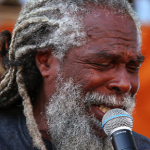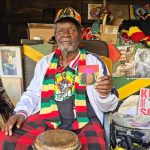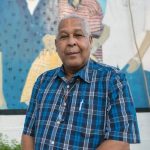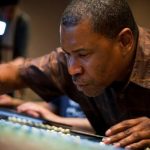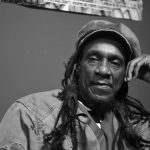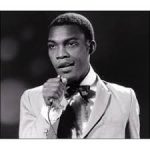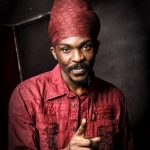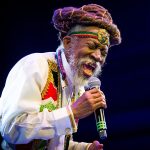Bunny Lee
The Legendary Life of Bunny Lee: A Reggae Pioneer
Introduction
Bunny Lee, a name synonymous with the evolution of reggae music, was a Jamaican record producer whose influence stretched far beyond his native island. His impact reached the music world globally. Known for his charismatic personality and innovative approach, Bunny Lee was a pivotal figure in shaping the reggae genre. This biography explores the life and legacy of Bunny Lee, delving into his early years and groundbreaking contributions to reggae. It also covers his lasting impact on the music industry.
Early Life and Background
Birth and Family Heritage
Bunny Lee was born Edward O’Sullivan Lee on August 23, 1941, in Kingston, Jamaica. Of mixed African, Irish, and Chinese heritage, he was the first of ten children born to Edward, a shoemaker, and Ruby (née McGraw), a housewife. Growing up in the impoverished district of Greenwich Town, Bunny Lee’s early life was marked by challenges. Yet, he maintained a deep connection to his community.
Education and Early Interests
Lee attended Greenwich Town Primary School, and later Denham Town Primary School. There, he was surrounded by aspiring singers. His passion for music was evident from a young age, influenced by the vibrant sounds of his environment. After studying electrical engineering at Kingston Technical High School, he gained practical experience at Teletronics, a local firm. Later, he worked in the parts department at United Motors and Kingston Industrial Garage.
The Birth of a Producer
Early Career and Musical Influences
Bunny Lee’s journey into the music industry began in the early 1960s as a record plugger. He worked with prominent promoters like Duke Reid, Clement Dodd, Leslie Kong, and Prince Buster. He helped gain airplay for ska records on the radio program “Teenage Dance Party.” His dedication to promoting Desmond Dekker’s single “Unity” in 1967 cost him his day job. However, it propelled him towards record production.
First Forays into Production
His first significant success as a producer came with Roy Shirley’s “Music Field,” a surreal track that marked the beginning of his illustrious career. Bunny Lee’s early productions in the late 1960s, such as the Uniques’ “Let Me Go Girl” and “My Conversation,” showcased his innate ability to craft hits. These resonated with audiences.
Pioneering the Reggae Sound
Defining Reggae in the Late 1960s
As the 1960s drew to a close, Bunny Lee was instrumental in defining the emerging reggae sound. His introduction of the organ shuffle on Stranger Cole and Lester Sterling’s “Bangarang” was a pivotal moment. It significantly impacted reggae’s evolution. The track “Regay Time,” featuring his brother Don on vocals, was one of the first to reference the genre by name.
Expansion into the UK Market
In 1968, Bunny Lee traveled to London at the invitation of Island Records founder Chris Blackwell. There, he licensed material to Trojan Records and the rival Pama label, gaining significant exposure for his productions in Britain. Max Romeo’s “Wet Dream,” despite a BBC ban, became a sensation and a chart-topping success.
Collaborations and Innovations
Working with Iconic Artists
Throughout his career, Bunny Lee worked closely with veteran performers like Owen Gray, Jackie Edwards, and Derrick Morgan. His collaboration with Lee “Scratch” Perry and Bob Marley on “Mr. Chatterbox” is noteworthy. Moreover, he employed Peter Tosh as a session musician.
The Dub Revolution
Bunny Lee’s partnership with sound engineer King Tubby revolutionized Jamaican music through the art of dub reggae. By helping Tubby acquire an obsolete mixing desk, Bunny Lee facilitated the creation of groundbreaking albums. Notable albums include “Dub from the Roots” and “The Roots of Dub,” which found a receptive audience in Britain.
The Rise of Roots Reggae
Dominating the 1970s Reggae Scene
In the early 1970s, Bunny Lee scored numerous hits with artists such as John Holt and Delroy Wilson. He also worked with Johnny Clarke. His introduction of the “flying cymbal” drumming style became a defining feature of reggae music during the mid-1970s. Bunny Lee also played a pivotal role in the rise of bass player Robbie Shakespeare. He also helped producers like Niney the Observer and Prince Jammy.
Embracing Dancehall and New Talents
In the late 1970s and early 1980s, Bunny Lee continued his innovative streak. He worked with keyboardist Jackie Mittoo and introduced dancehall artists like Barry Brown and Don Carlos. He also worked with King Kong. Notably, he produced Beenie Man’s first album, “The Invincible,” when the artist was just ten years old.
Legacy and Recognition
Later Years and Reissues
Although Bunny Lee’s output began to slow in the 1980s, his work was reintroduced to new audiences. This was possible through reissue programs by labels such as Blood and Fire, Jamaican Recordings, and Pressure Sounds. His contributions to music were formally recognized in 2008. In that year, he was awarded the Order of Distinction by the Jamaican government.
Personal Life and Legacy
Bunny Lee’s personal life was as eventful as his career. His first marriage, to Marva, ended in divorce. He is survived by his second wife, Annette Wong-Lee, and an estimated 35 children. Bunny Lee’s legacy is captured in the authorized biography “Reggae Going International: The Bunny ‘Striker’ Lee Story.” The documentary film “I Am the Gorgon” also documents his legacy.
Conclusion
Bunny Lee’s influence on reggae music is immeasurable. His ability to innovate and adapt ensured his place as a legendary figure in the genre’s history. Through his collaborations, pioneering techniques, and dedication to nurturing new talent, Bunny Lee left an indelible mark. His influence on the music world continues to inspire and resonate with audiences today.

